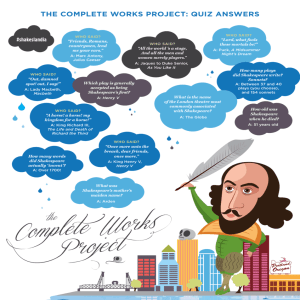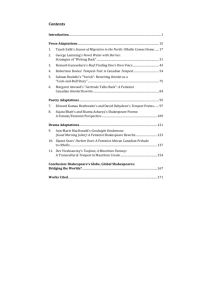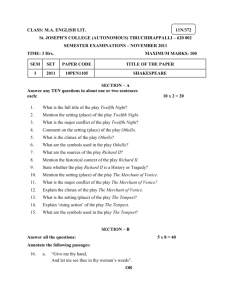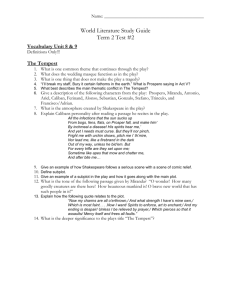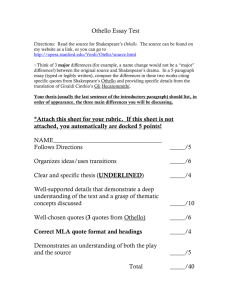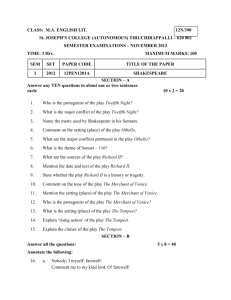Syllabus - Shakespeareprof
advertisement
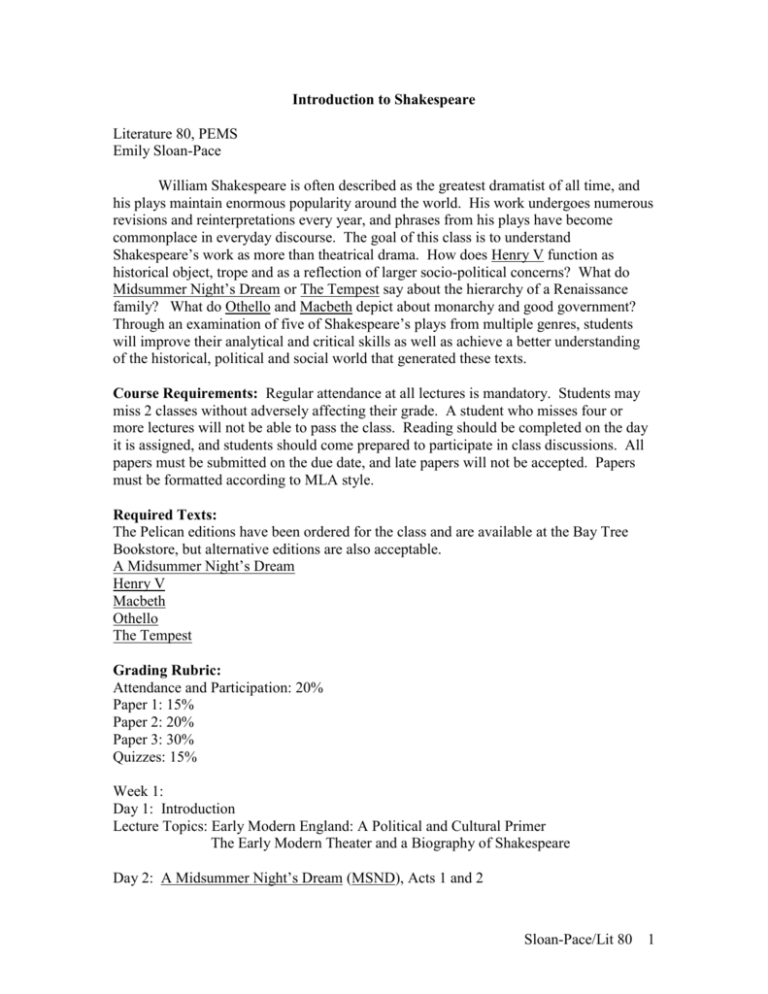
Introduction to Shakespeare Literature 80, PEMS Emily Sloan-Pace William Shakespeare is often described as the greatest dramatist of all time, and his plays maintain enormous popularity around the world. His work undergoes numerous revisions and reinterpretations every year, and phrases from his plays have become commonplace in everyday discourse. The goal of this class is to understand Shakespeare’s work as more than theatrical drama. How does Henry V function as historical object, trope and as a reflection of larger socio-political concerns? What do Midsummer Night’s Dream or The Tempest say about the hierarchy of a Renaissance family? What do Othello and Macbeth depict about monarchy and good government? Through an examination of five of Shakespeare’s plays from multiple genres, students will improve their analytical and critical skills as well as achieve a better understanding of the historical, political and social world that generated these texts. Course Requirements: Regular attendance at all lectures is mandatory. Students may miss 2 classes without adversely affecting their grade. A student who misses four or more lectures will not be able to pass the class. Reading should be completed on the day it is assigned, and students should come prepared to participate in class discussions. All papers must be submitted on the due date, and late papers will not be accepted. Papers must be formatted according to MLA style. Required Texts: The Pelican editions have been ordered for the class and are available at the Bay Tree Bookstore, but alternative editions are also acceptable. A Midsummer Night’s Dream Henry V Macbeth Othello The Tempest Grading Rubric: Attendance and Participation: 20% Paper 1: 15% Paper 2: 20% Paper 3: 30% Quizzes: 15% Week 1: Day 1: Introduction Lecture Topics: Early Modern England: A Political and Cultural Primer The Early Modern Theater and a Biography of Shakespeare Day 2: A Midsummer Night’s Dream (MSND), Acts 1 and 2 Sloan-Pace/Lit 80 1 Ovid’s “Pyramus and Thisbe” (eres) Lecture Topics: Revision and Intertextuality Renaissance Printing: The Rise of the Book Day 3: MSND, Acts 3 and 4 Lecture Topic: The Play’s The Thing: Meta-Theatricality Week 2: Day 4: MSND, Act 5 The Tempest, Act 1 Lecture Topic: No Man is an Island: The Empire and the Individual Day 5: The Tempest, Acts 2 and 3 Lecture Topic: The Raw and the Cooked: Colonialism and Post-Colonialism In Class Quiz on MSND Day 6: The Tempest, Acts 4 and 5 Lecture Topic: The Play’s The Thing, Redux: The Masque Tradition 4 Page essay due on MSND Week 3: Day 7: Henry V, Acts 1 and 2 Lecture Topic: The Genre of History In Class Quiz on the Tempest Day 8: Henry V, Acts 3 and 4 Lecture Topic: Monarchy and Masculinity in Early Modern England Day 9: Henry V, Act 5 Othello, Act 1 Lecture Topic: Fathers and Daughters: Patriarchy and Possession Week 4: Day 10: Othello, Acts 2 and 3 Lecture Topic: Conceptions of Race in Early Modern England In Class Quiz on Henry V Day 11: Othello, Act 4 and 5 Lecture Topic: Aristotle and Theories of Drama 5-6 Page Paper due in class on Henry V and The Tempest Day 12: Macbeth, Acts 1 and 2 Lecture Topic: Witchcraft and Magic in the Renaissance Week 5: Day 13: Macbeth, Acts 3 and 4 Sloan-Pace/Lit 80 2 Lecture Topic: The King And I: James I as Spectator Day 14: Macbeth, Act 5 Conclusions: Shakespeare and the Human Condition 10-12 Page Paper due on Macbeth and Othello at NOON due the day of the final. Sloan-Pace/Lit 80 3
